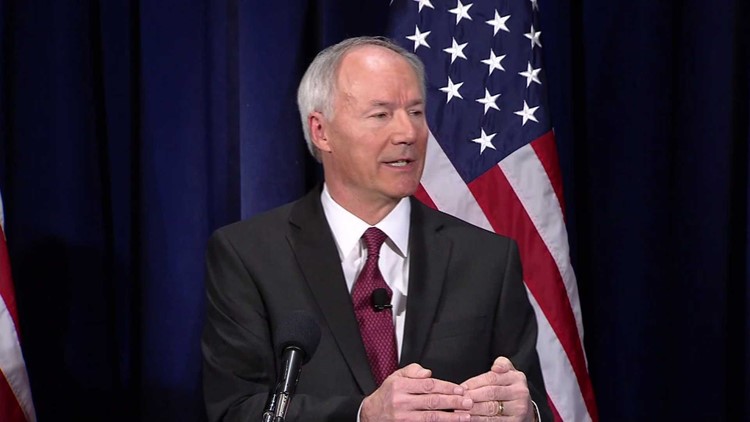LITTLE ROCK, Ark. (AP) — Arkansas Gov. Asa Hutchinson said Wednesday he’ll sign legislation cutting off funding to “sanctuary cities” that don’t cooperate with federal immigration authorities despite the Republican’s objections that the measure could open the door to racial profiling.
The governor announced he would sign the measure, which would also prevent cities from blocking local law enforcement from asking about a person’s citizenship or immigration status. Any cities found to be in violation would be ineligible to receive discretionary funds administered by the state.
Hutchinson, a former federal Homeland Security official during the George W. Bush presidency who oversaw border security efforts, had asked the bill’s sponsors to require probable cause before law enforcement asked about citizenship and immigration status. He said that without the change there would be too much opportunity for racial profiling. Lawmakers rebuffed the request, but Hutchinson said the sponsor assured him he was willing to change the law in a special or regular session to include that language.
The governor said he opposes sanctuary cities and generally supports prohibiting such policies. Hutchinson, however, repeated his concern that the bill doesn’t allow cities to give law enforcement guidance and would leave it up to officers about when to ask for proof of citizenship.
“This would lead to profiling and indiscriminate questioning of citizens of the United States based solely on the officer’s determination that the citizen looks different than what the officer thinks a U.S. citizen should look like,” Hutchinson wrote. “This is contrary to the fundamentals of our Constitution.”
Hutchinson told reporters that concern wasn’t enough to veto the bill since there aren’t any sanctuary cities in Arkansas as defined by the bill.
“I don’t see any change in policy going forward that would be disruptive to our society,” he said.
Advocates said the measure opens the state and cities to lawsuits and that officials need to reassure the immigrant community that they’re welcome.
“Our immigrant community is afraid, and they are so confused. They don’t even know if they can come out of their houses right now,” Mireya Reith, founding executive director of Arkansas United, an immigrant advocacy group.
The majority-Republican House earlier approved the bill by a 71-24 vote and sent it to Hutchinson’s desk. Supporters have called it a preventive measure.
“This is not about racial profiling. This is about following the law,” House Majority Leader Marcus Richmond, who voted for the bill, said on the floor.
Several Republican states have enacted measures prohibiting sanctuary policies, which have also been targeted by President Donald Trump.
Opponents have said the proposal would damage law enforcement’s relationships with the immigrant community. Another opponent made a religious appeal to colleagues as she urged them to vote against the bill.
“We in this room are lawmakers and if we are lawmakers who claim Christ we can and should do the work of making just and fair laws that also embody the compassion of Christ and his command to welcome the stranger into our communities,” Democratic Rep. Megan Godfrey said.
Under the bill, the state’s attorney general would investigate complaints that a city had illegal sanctuary policies. If the city was found to be in violation, it would be ineligible for discretionary funds administered by the state.
Hutchinson announced his decision after signing two bills cheered by the immigrant community, including one that allows public colleges and universities to charge in-state tuition to certain students currently paying higher, out-of-state rates. That includes students in the Deferred Action for Childhood Arrivals Program, a program implemented during former President Barack Obama’s administration allowing young immigrants living in the country illegally who were brought here as children to remain in the U.S. Another bill Hutchinson signed would allow DACA recipients to get nursing licenses.
“We’re a welcoming state and we want to be able to continue that,” Hutchinson said at the bill-signing ceremony. “I don’t want anything to overshadow the good news by these two bills and that we’ll continue to be a nation of law, but also a nation of compassion.”



